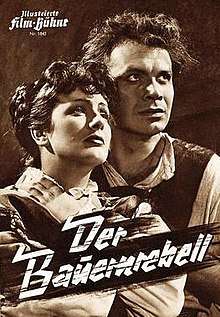The Last Reserves
The Last Reserves (German: Das letzte Aufgebot) is a 1953 Austrian historical drama film directed by Alfred Lehner and starring Marianne Schönauer, Kurt Heintel and Eduard Köck.[1] In West Germany it was released under the alternative title Der Bauernrebell.
| The Last Reserves | |
|---|---|
 | |
| Directed by | Alfred Lehner |
| Produced by | Alfred Lehner |
| Written by | Ernest Stefan Nießner |
| Starring | Marianne Schönauer Kurt Heintel Eduard Köck |
| Music by | Bert Rudolf |
| Cinematography | Fritz von Friedl |
| Edited by | Renate Knitschke |
Production company | Listo Film |
| Distributed by | Union Film |
Release date | 16 January 1953 |
Running time | 88 minutes |
| Country | Austria |
| Language | German |
The film's sets were designed by the art director Gustav Abel. It was shot at Ringfilm's Studios in Vienna and on location in Tyrol.
Cast
- Marianne Schönauer as Traudi Grabner
- Kurt Heintel as Martin Sellrainer
- Georg Filser as Stefan Sellrainer
- Eduard Köck as Tobias Sellrainer - der alte Bauer
- Margit Seeber as Verena Schneider
- Leopold Rudolf as Raffl
- Hans Brand as Pater Konrad
- Alfred Schnayder as Vinzenz - Gemeindeschreiber
- Hans Raimund Richter as Lukas - Knecht
- Otto Loewe as Andreas Hofer
- Rudolf Vones as Sepp Schneider
- Emmerich Schrenk as Pucher
- Anna Olesk
- Eduard Benoni as Französischer Kurier
- Vera Oelmann
- Fritz von Friedl
- Johannes Ferigo
- Eduard Kautzner
- Albert Rueprecht
- Peter Brand
- Ignaz Fischer
- Greta Georgi
gollark: It has an innovative syntax-based type system.
gollark: For the lulz™, me and a friend wrote a partial exam board "pseudocode" to exam board "assembly" compiler.
gollark: The exam board for computer science here writes "pseudocode" in a deranged BASIC derivative which is actually fairly well specified.
gollark: I suppose someone (actually, many people) probably made a BASIC→JS compiler at some point.
gollark: I would be impressed if they managed to write a webapp in that.
References
- Fritsche p.243
Bibliography
- Fritsche, Maria. Homemade Men in Postwar Austrian Cinema: Nationhood, Genre and Masculinity. Berghahn Books, 2013.
This article is issued from Wikipedia. The text is licensed under Creative Commons - Attribution - Sharealike. Additional terms may apply for the media files.